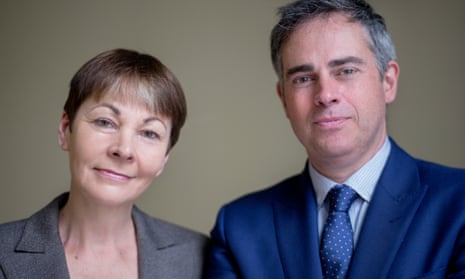Labour and the Liberal Democrats have dismissed a call from the Greens for an election pact, after the party’s co-leaders wrote to Jeremy Corbyn and Tim Farron to say this was the only way to keep the Conservatives out.
Caroline Lucas and Jonathan Bartley wrote to their counterparts to argue that cooperation between centre-left parties was the the only way to “stop the Tories from wrecking our country for generations to come”.
Doing so could be the route to seeing off an “extreme” form of Brexit and to help deliver a fairer voting system, they argued.
The Greens have previously argued for a so-called progressive alliance in which centre-left parties avoid competing against each other in certain seats as a way of combating the Conservatives.
However, Corbyn, who has previously expressed opposition to the idea, ruled out any pacts with the Greens or Lib Dems, or the SNP, at a meeting of Labour’s national executive committee on Wednesday, a party source said.
Separately, a spokeswoman for the party leader said there were no plans to talk about a progressive alliance. “Labour will be fighting for every seat in this election,” she said.
At an event in Richmond in south-west London earlier on Wednesday, Farron reiterated his own scepticism about the idea.
“I very much enjoyed working with Caroline Lucas during the referendum campaign, [she is] someone I’ve got a very high regard for. She’s been a very powerful voice in parliament,” he told reporters. “But it’s worth saying that the only plausible route of any kind towards the Conservatives not winning a majority is a Liberal Democrat group.”
The Greens opted to not field a candidate in December’s Richmond byelection, where the Lib Dems unseated the Conservatives’ Zac Goldsmith. At the time, some Labour figures, among them Lisa Nandy, Clive Lewis and Jonathan Reynolds, argued their party should consider a similar move.
Nandy has co-edited a book on the idea with Lucas and Chris Bowers, a former Lib Dem parliamentary candidate.
Wednesday’s letter avoids the term progressive alliance, and talks about such deals happening in “a handful of seats”, but stresses the potential importance of the move.
Requesting a meeting with Corbyn and Farron, Lucas and Bartley say they are “deeply concerned too about the prospect of a further Conservative majority and the impact on our crumbling NHS, the housing crisis, the environment and what for young people is a bleak and uncertain future”.
The letter continues: “We understand that, in the immediate run-up to an election, signalling a willingness to work with other parties might be difficult but we hope you’ll agree that the times we are living in require leaders to be courageous and visionary, to actively build a more positive politics.
“Britain is at a crossroads – and this election will dictate the very future of our country. Many of the public want us to join forces to help stop the Tories from further wrecking our country for generations to come and we hope you will be willing to at least take the first step and meet with us.”
Members of Corbyn’s team have in the past informally explored the idea of such cooperation, for example as a way of keeping the Ukip leader, Paul Nuttall, from victory in February’s Stoke Central byelection.
An analysis of the 2015 election by the Compass thinktank, a leading supporter of the idea, has identified more than 100 seats where a progressive alliance could have an impact in reducing the number of Conservative MPs.
Its figures showed that there were 47 constituencies where the combined centre-left vote was greater than the winning 2015 Conservative tally, and 41 more where it is behind by 5% or less.
They also identify a further 48 seats in which one of the parties is 10% or less in front of the Tories or Ukip, and which could be defended by such an alliance.
The Greens said they planned to make further announcements on the idea of some form of pact for 8 June, and stressed any decisions would have to be made at a local party level.
Lucas said: “Britain is at a crossroads – and this election will dictate the very future of our country.” She continued: “Our call for a meeting between party leaders isn’t about the Greens standing aside – it’s about giving people in this country the best possible chance of defeating the Conservatives and bringing in a truly democratic voting system.”
